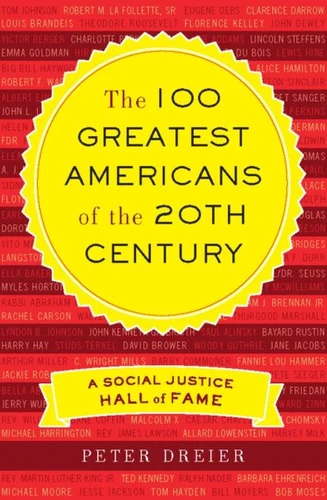The 100 Greatest Americans of the 20th Century. A Social Justice Hall of Fame
Par :Formats :
Disponible dans votre compte client Decitre ou Furet du Nord dès validation de votre commande. Le format ePub protégé est :
- Compatible avec une lecture sur My Vivlio (smartphone, tablette, ordinateur)
- Compatible avec une lecture sur liseuses Vivlio
- Pour les liseuses autres que Vivlio, vous devez utiliser le logiciel Adobe Digital Edition. Non compatible avec la lecture sur les liseuses Kindle, Remarkable et Sony
- Non compatible avec un achat hors France métropolitaine
 , qui est-ce ?
, qui est-ce ?Notre partenaire de plateforme de lecture numérique où vous retrouverez l'ensemble de vos ebooks gratuitement
Pour en savoir plus sur nos ebooks, consultez notre aide en ligne ici
- Nombre de pages400
- FormatePub
- ISBN978-1-56858-694-6
- EAN9781568586946
- Date de parution25/06/2012
- Protection num.Adobe DRM
- Infos supplémentairesepub
- ÉditeurBold Type Books
Résumé
A hundred years ago, any soapbox orator who called for women's suffrage, laws protecting the environment, an end to lynching, or a federal minimum wage was considered a utopian dreamer or a dangerous socialist. Now we take these ideas for granted -- because the radical ideas of one generation are often the common sense of the next. We all stand on the shoulders of earlier generations of radicals and reformers who challenged the status quo of their day.
Unfortunately, most Americans know little of this progressive history. It isn't taught in most high schools. You can't find it on the major television networks. In popular media, the most persistent interpreter of America's radical past is Glenn Beck, who teaches viewers a wildly inaccurate history of unions, civil rights, and the American Left. The 100 Greatest Americans of the 20th Century, a colorful and witty history of the most influential progressive leaders of the twentieth century and beyond, is the perfect antidote.
Unfortunately, most Americans know little of this progressive history. It isn't taught in most high schools. You can't find it on the major television networks. In popular media, the most persistent interpreter of America's radical past is Glenn Beck, who teaches viewers a wildly inaccurate history of unions, civil rights, and the American Left. The 100 Greatest Americans of the 20th Century, a colorful and witty history of the most influential progressive leaders of the twentieth century and beyond, is the perfect antidote.
A hundred years ago, any soapbox orator who called for women's suffrage, laws protecting the environment, an end to lynching, or a federal minimum wage was considered a utopian dreamer or a dangerous socialist. Now we take these ideas for granted -- because the radical ideas of one generation are often the common sense of the next. We all stand on the shoulders of earlier generations of radicals and reformers who challenged the status quo of their day.
Unfortunately, most Americans know little of this progressive history. It isn't taught in most high schools. You can't find it on the major television networks. In popular media, the most persistent interpreter of America's radical past is Glenn Beck, who teaches viewers a wildly inaccurate history of unions, civil rights, and the American Left. The 100 Greatest Americans of the 20th Century, a colorful and witty history of the most influential progressive leaders of the twentieth century and beyond, is the perfect antidote.
Unfortunately, most Americans know little of this progressive history. It isn't taught in most high schools. You can't find it on the major television networks. In popular media, the most persistent interpreter of America's radical past is Glenn Beck, who teaches viewers a wildly inaccurate history of unions, civil rights, and the American Left. The 100 Greatest Americans of the 20th Century, a colorful and witty history of the most influential progressive leaders of the twentieth century and beyond, is the perfect antidote.










